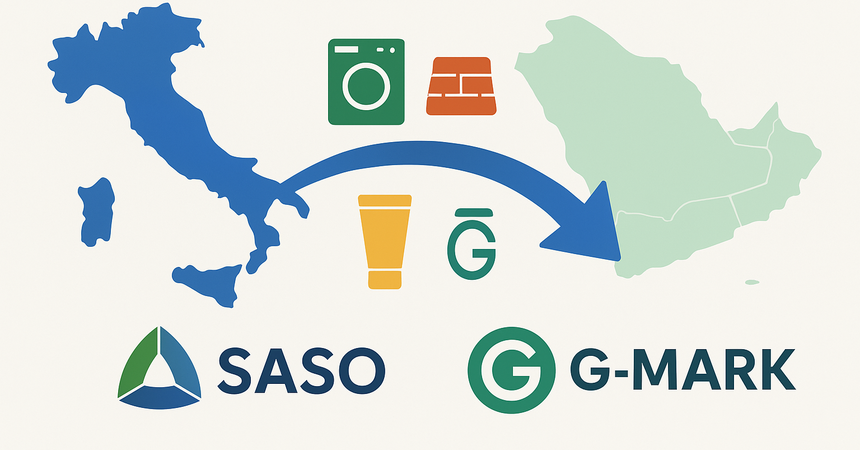The Middle East is a region where quality, reliability, and product origin play a decisive role in supplier selection.
The Made in Italy label has long been associated with innovation, design, and the highest standards.
However, to officially sell products in GCC countries (Gulf Cooperation Council) — Saudi Arabia, UAE, Qatar, Kuwait, Bahrain, and Oman — Italian manufacturers must undergo certification according to local technical regulations: SASO and G-Mark.
These certifications confirm that products meet the safety, energy efficiency, and quality requirements established for Gulf countries.
SASO and G-Mark — Two Keys to the Middle Eastern Market
SASO (Saudi Standards, Metrology and Quality Organization)Mandatory certification for goods exported to Saudi Arabia.
Since 2019, the process has been fully digitalized via the SABER platform.
SASO Certificate is required for:
- Household and industrial electronics
- Construction and finishing materials
- Cables and metal products
- Vehicles and automotive components
G-Mark (Gulf Conformity Mark)
Applies to all GCC countries: UAE, Kuwait, Qatar, Oman, Bahrain, and Saudi Arabia.
The G-Mark label confirms that the product complies with safety standards established by the GSO (Gulf Standardization Organization).
Mandatory for:
- Electrical and electronic equipment
- Gas appliances
- Children’s toys and high-risk products
Validity: up to 3 years.
Why Italian Companies Have an AdvantageItalian industry is inherently aligned with ISO, IEC, and EN standards — the same technical foundation used in GCC countries.
This means that Italian products already meet most international requirements, making certification faster and smoother.
Advantages of Made in Italy:
- Existing CE documentation
- High-quality production processes (ISO 9001, ISO 14001)
- Compliance with international electrical safety norms
- Recognition of European testing laboratories
Common Mistakes by Italian Companies
- Shipping goods without registration on the SABER system (Saudi Arabia).
- Failing to translate manuals and labels into Arabic.
- Relying solely on the CE certificate without adapting it to GCC standards.
- Incorrect G-Mark labeling.
- Lack of a local representative or partner in the region.
Expert Recommendations from WorldWideBridge
- Use existing CE and ISO certificates as a base, but adapt them to GCC regulations.
- Appoint an authorized representative in one of the Gulf countries.
- Ensure packaging and labeling comply with local standards.
- Allow 6–10 weeks for certification to avoid shipment delays.
Conclusion
For Italian manufacturers, SASO and G-Mark certification is not just a bureaucratic requirement — it’s a strategic key to entering one of the world’s fastest-growing markets.Certified Made in Italy products inspire trust, enable participation in public tenders, and ensure stable export growth across the GCC.
WorldWideBridge assists Italian companies with the entire certification process — from preparing documentation and testing to translation and final approval.
We ensure your Made in Italy products meet GCC standards and can be sold legally and successfully across the Middle East.
